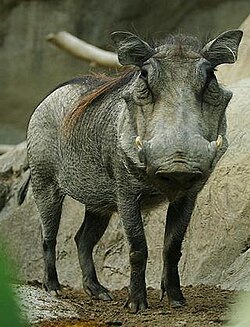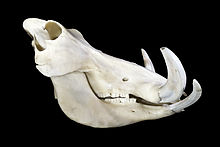Warthog
Warthogs (Phacochoerus africanus) are members of the pig family. They are found in most of Africa south of the Sahara and are widely distributed in East Africa. They are the only pigs able to live in areas without water for several months of the year. By tolerating a higher-than-normal body temperature, the warthog is perhaps able to conserve moisture inside its body that might otherwise be used for cooling.Camels and desert gazelles have developed a similar mechanism for survival in hot dry places..
| Warthog | |
|---|---|

| |
| Scientific classification | |
| Kingdom: | |
| Phylum: | |
| Class: | |
| Order: | |
| Family: | |
| Genus: | |
| Species: | P. africanus
|
| Binomial name | |
| Phacochoerus africanus (Pallas, 1766)
| |

Description
changeThe common warthog is a large bodied animal. Males are bigger than females. Both sexes have tusks which they use for fighting and defending themselves. They weigh between 45 and 150 kg (99 and 331 lb).
Behavior
changeCommon warthogs live in groups called sounders. Females live in sounders with their young and with other females. Males live alone when they become adults. Both males and females have two facial glands: the tusk gland and the sebaceous gland. Common warthogs of both sexes begin to mark around six to seven months old. Males tend to mark more than females. They mark sleeping and feeding areas and waterholes.
They are seasonal breeders.
Common warthogs live for an average of 7 to 11 years in the wild. In captivity they can live 21 years.[1]
Habitat
changeWarthogs are found in moist and arid savannas. They avoid rainforest, deserts and high mountains.
References
change- ↑ Creel, Eileen. "Phacochoerus africanus (common warthog)". Animal Diversity Web. Retrieved 2023-12-12.
